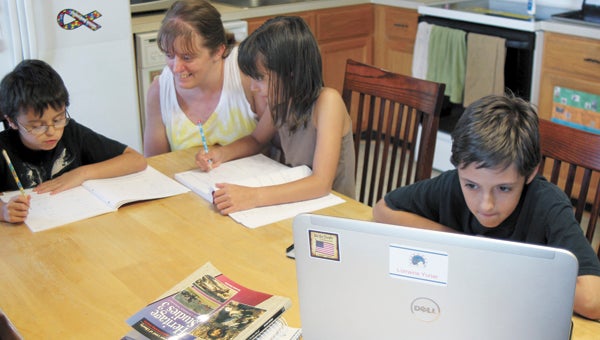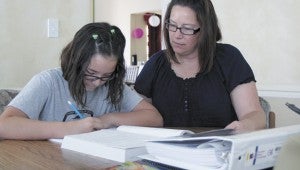Families opt out of the classroom
Published 10:02 pm Saturday, October 12, 2013

On their kitchen table, Suffolk home-schooling mom Lorraine Yuriar helps William, 8, Brenna, 10, and Anthony, 12, with their lessons. “If they want to get into something, we will look into finding a class to do that kind of stuff,” Yuriar said.
Any mother of three young children could claim to have her hands full, but Suffolk’s Lorraine Yuriar could probably do so with more legitimacy than most.
Yuriar is home-schooling William, 8, Brenna, 10, and Anthony, 12.
Her and husband Anthony Yuriar Sr.’s abode is like a hybrid home-schoolhouse.
In the kitchen, the fridge bears a mechanical engineering diagram with fulcrums and levers, and the cabinet doors hold history timelines. Many of the educational adornments posted on the walls were devised by the children themselves as assignments.
When the children spread out on the kitchen table with their laptops, books and worksheets, their faithful pooch “Peanut” likes to wind between their legs.
Lorraine Yuriar says she is home schooling her children because of the “dumbing-down” of mainstream education. She believes that unlike in a classroom, where teaching is more rigid and brighter students may not be challenged enough and become bored or disruptive, home schooling allows parents and guardians to tailor lessons to individual interests and aptitudes.
“If they want to get into something, we will look into finding a class to do that kind of stuff,” Yuriar said. “They don’t have to wait for me, they can just come in here and start working.”

For the first time this year, Suffolk’s Amber Feliciano is home-schooling fifth-grader Kayla. She says she’s a bit nervous but wants her daughter to learn more than just content for standardized tests.
In Suffolk, the popularity of home schooling has been a little erratic during the past five years but appears to be on the rise again.
Suffolk Public Schools reported 524 students registered for home schooling in 2009, 537 in 2010, 431 in 2011, 421 last year, and 445 in 2013.
The U.S. Department of Education’s National Center of Education Statistics reports that while 1.5 million American children were home-schooled in 2007, this year the number has risen to 1.77 million.
In Virginia, the Department of Education reports 16,542 students were registered for home schooling in 2002, and the figure rose to 25,255 in 2011 — the most recent year the data was available.
The department also tracks how many registrations are granted religious exemptions by school boards. That number was 6,809 in 2011, up from 5,479 in 2002. Department spokesman Charles Pyle said in an email that homes granted religious exemption don’t have to report back to the school division, “so neither the local school superintendent nor VDOE know what, if any, instruction is being provided.”
The Felicianos are another Suffolk home-schooling family. Amber Feliciano said she pulled fifth-grader daughter Kayla out of Kilby Shores Elementary School this year because of the increasing focus on standardized testing.
“As soon as they get to fourth grade, in my opinion, the education kind of reverses,” she said. “It goes from teaching students to only focusing on SOLs (Standards of Learning).”
While Feliciano praised teachers at the school her other two children, third-grader Malia and first-grader Tyler, still attend, she said she wants her children to be more than just good test-takers.
She plans to pull her other two children and home school them as well.
“Why would you want to send your children there when you have the opportunity and are able to give your child a better education at home?” she asked.
Jacqueline Chavis, deputy superintendent with Suffolk Public Schools, said in an email that “talking with a school or system representative may clarify or address concerns parents may have.”
Before deciding to home school, she suggested parents should “ask questions and get concrete information about the school their child would be assigned.”
“Parents may be considering home schooling their child based on something they’ve heard, read or experienced in another setting,” she said.
“When considering home schooling, parents typically consider their level of expertise in teaching every subject area, resistance from the child in not attending school with his or her peers, opportunities for the child to engage socially with their peers if they will not be involved in sport activities and other activities offered at school.
“Parents must also be prepared to invest in the time required to plan, implement and assess quality lessons for their children.”
Feliciano said the decision to home-school was hard, because Kilby Shores Elementary has “phenomenal teachers, but when you feel like their education is at risk, that’s when you have to (decide) which one is more important, and her education is more important.”
New to home schooling, she admitted to being “a little nervous” about teaching Kayla. “My daughter is very smart,” she said. “I know there’s going to be a time when she’s going to pass me. We are going to be learning together.”
She said Kayla is concerned about maintaining the friendships she made at Kilby Shores. “We will keep her active with soccer, and keep her in touch with her friends in school,” she said.
Kayla said she wanted to stay at the school with her friends, but “the way they were teaching us wasn’t really that good. Our teachers were going over the main thing we were learning about a few times, and then we would be testing the next day about it.”
She said she collected her friends’ email addresses and phone numbers, “so I call them and email them.”
“I feel excited” about starting home schooling, Kayla said. “I think it will be a good learning experience.”
Back at the Yuriar home, 12-year-old Anthony Yuriar says that while keeping up with his lessons, he’s writing a novel: “Joe Nixon and the Mystery of the Egyptian Treasure.”
His mom said he might self-publish.


